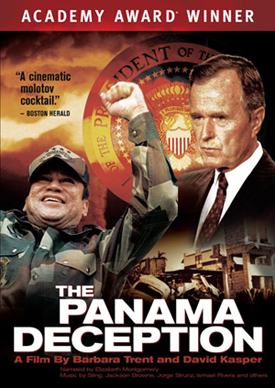|
Reviews of Recent Independent, Foreign, & Documentary Films in Theaters and DVD/Home Video
Directed by Barbara Trent. Written and Edited by David Kasper. Produced by Trent, Joanne Doroshow, Nico Panigutti & Kasper. Released by Docurama. USA. 91 min. Not Rated. Narrated by Elizabeth Montgomery. DVD Features: Follow-up interviews with filmmakers Barbara Trent & David Kasper. Panama to Iraq: The Trajectory of U.S. Militarism. The Future of Panama & Latin America. The Politics of Demonization and Fear, with Phyllis Bennis. Panama After the Invasion, with Humberto Brown. Trailers. Resource Guide. Filmmaker biographies. In a time when the media devote more coverage to celebutantes than civilian causalities in Iraq, The Panama Deception should be mandatory viewing for serious journalists. With searing content worthy of its 1992 Best Documentary Feature Academy Award, the film is a detailed, unflinching look at U.S. policy and propaganda in an invasion condemned by the international community. More relevant than ever, The Panama Deception documents the appalling “might makes right” mentality, which brought about thousands of civilian casualties during the U.S. overthrow of General Manuel Noriega. Critics, including some military insiders who took part in the invasion, have dubbed the film as one-sided, but the use of eyewitness testimony and international news reports offer credibility. The film examines Noriega’s longstanding ties to the Central Intelligence Agency, the Drug Enforcement Administration, and the first Bush White House. Allegations of the military’s use of previously untested cutting-edge laser weapons are also explored. In addition, filmmakers Barbara Trent and David Kasper pinpoint ulterior motives for the military overthrow: neutralizing the Panamanian army, thereby invalidating a treaty that would have turned over control of the Panama Canal to the Panamanians in 2000. A time capsule of sorts, the film is full of longtime Bush family cronies: Dick Chaney, Colin Powell, and, most surprisingly, Pete Williams, the then woefully uninformed Pentagon mouthpiece. Williams – who now works in Washington for NBC – apparently bought the military's initial version of events lock, stock, and barrel. One wonders why Williams has not penned his own memoir – including an insider’s look at U.S. Government propaganda and media manipulation. Could it be that Williams doesn't want to burn any bridges? From a filmmaking stand point, simplistic post production and pacing are problems. The aesthetic impact of the documentary could’ve been heightened if Trent used culturally relevant music instead of repetitive generic Sting instrumentals. But clear, crisp, narration by Elizabeth Montgomery underscores the sensitivity the late actress brought to her voice-over work.
As documented in the film, one huge media oversight was the lack of coverage of the U.N. resolution condemning the invasion. Another was a myopic
focus on the handful of U.S. military causalities, contrasted to the utter lack of coverage on the staggering loss of Panamanian civilians. The
confluence of a military containment of the free press, and its blatant self-censorship, provide a cautionary tale. With increasing network cutbacks
and fewer "boots on the ground" reporters, the dangers of such journalistic travesties exist today in Iraq and around the world. While
The Panama Deception is not pleasurable to watch, it is thoughtful and sadly illuminating. Elisa Klein
|

